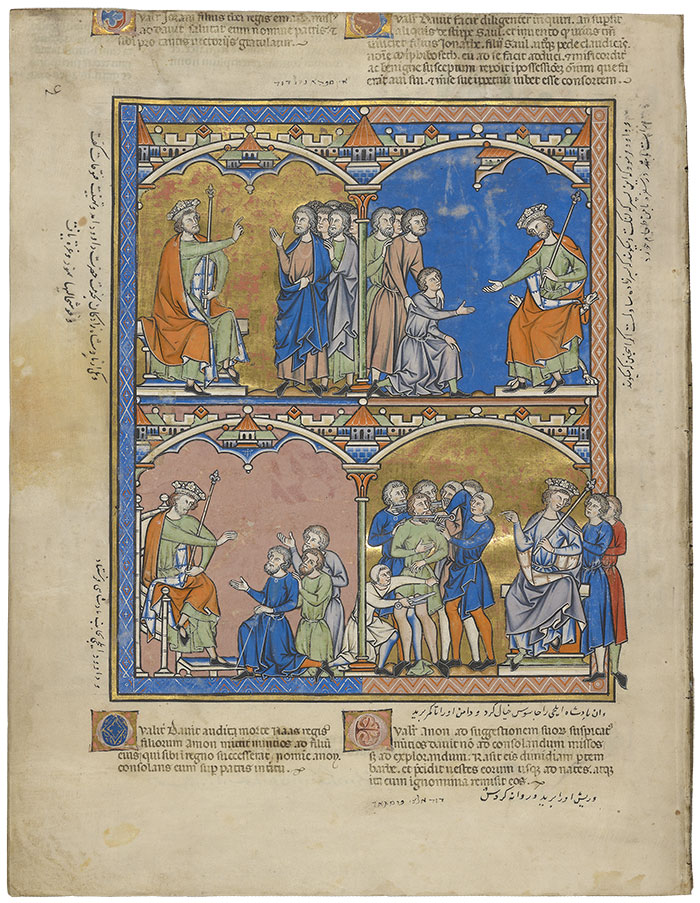
David's Command to Ziba, David's Great Charity, Diplomacy, Shameful Treatment
Old Testament Miniatures with Latin, Persian, and Judeo-Persian inscriptions
Purchased by J.P. Morgan (1867–1943) in 1916
David's Command to Ziba
David learns from Ziba, a former servant of Saul, that a member of Saul's house still lives. He is the crippled Mephibosheth, Jonathan's son. David orders Ziba to fetch him. (2 Kings 9:2–5)
David's Great Charity
Ziba presents Mephibosheth, Jonathan's son, to the king. David takes his hand and swears to Mephibosheth that he will always eat at the king's table. Moreover, the king once more sets Ziba and his house under Mephibosheth, to insure that Jonathan's progeny will thrive. (2 Kings 9:6–7)
Diplomacy
The king of Ammon has died, and his son has succeeded him. David, who was once allied with the king, sends messengers to show his good will toward the new ruler. (2 Kings 10:1–2)
Shameful Treatment
David's envoys arrive in Ammon to offer his friendship to Hanun, the new king. Hanun's servants, suspicious of David's intentions, persuade the king that David has sent his men to spy. Hanun thus shamefully orders that half of each man's beard be cut off and their clothes cut to reveal their nakedness. (2 Kings 10:3–4)
Folio 40v (Latin)
Upper left: How, sent to David, Joram, the son of Toi, the king of Hamath salutes him and congratulates him on his great victories. (2 Samuel 8: 9–10)
Upper right: How David devised that it be diligently inquired if anyone of the house of Saul had survived. Once it was found that one of the sons of Jonathan, Saul’s son, Mephibosheth by name was still alive, and that both his feet were lame, David has him brought to him, talks to him mercifully and kindly and reinstates him over all of his grandfather’s properties. He also orders him to eat at his table perpetually. (2 Samuel 9)
Lower left: How, upon hearing about the death of Nahash, the king of the children of Ammon, David sends messengers to his son, Hanun by name, who had succeeded him, consoling him for his father’s death. (2 Samuel 10:1–2)
Lower right: How Hanun, who, following his men’s suggestion, suspected that David’s messengers were sent not to console him but to spy, shaved off one half of their beards and cut away their clothes up to their buttocks and thus sent them back disgracefully. (2 Samuel 10: 3–4)
Folio 40v (Persian)
Persian foliation: 4
Upper left margin: One of the princes came to His Excellence David and congratulated him on the conquests and was joyous and received honor.
Upper right margin: David said that, "This boy is lame and is said to be the grandson of Saul. If what they say is true, he shall dine at my table."
Lower left margin: David sent an ambassador to a king.
Lower right, above and below Latin inscription: That king assumed that the ambassador was a spy and cut off his skirt to the waist, cut his beard, and sent him off.
Folio 40v (Judeo-Persian)
Upper half, middle: These pages [belong] to the Tale of David.
Lower right, beneath Latin, left: David sends an ambassador.
Italicized words are in Hebrew.
Content consultant: Richard Leson
Persian translated by Sussan Babaie
Judeo-Persian translated by Vera Basch Moreen
Latin translation by Eran Lupu
After the commentary volume accompanying the Fine Art Facsimile edition by Faksimile Verlag Luzern
